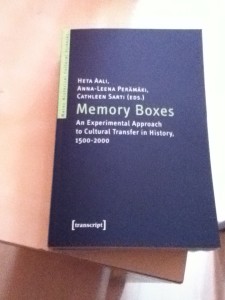The project Memory Boxes. An Experimental Approach to Cultural Transfer in History, 1500-2000 has come to its happy end:

This project between the Cultural History Department at the University of Turku, Finland and the Research Unit Historical Cultural Sciences at the University of Mainz, Germany started in 2010, when a group from Mainz (myself included) visited Turku and got to talking about cultural transfer/cultural encounters. Until it all really came together – finding the participants, finding a concept which promised some new insights into our research topics, and applying for funding from the DAAD (Germany) and the Academy of Finland, it was already late 2011.
2012 and 2013 saw us visiting each other twice a year, and really struggling with applying theory to the actual research. After all, the theoretical concept was supposed to add something to our projects. However, at the end of 2013 our articles, introductions and conclusion was finally done, and we (myself together with two lovely colleagues from Turku, Heta and Anna-Leena) brought our book the last steps to be published. And now, it’s finally here!
Now, what is it all about?
Basically, our project group of ten people used the concept of memory boxes to be able to take a closer look at cultural transfer through time and space. A memory box is identified as a material or immaterial object (we used the categories topoi, personalities, and artefacts) which is encountered in different cultural contexts. Different meanings are attached to such a memory box in every different cultural setting, while at the same time, the older meanings still influence their interpretation. Therefore, a memory box helps us to understand a cultural setting by taking into account older influences.
Alright, alright – this sounds very abstract. To make it a bit concreter:
my case study was the development of the topos providence in 16th- and 17th century England as well as 17th- to 20th century America. It could clearly be stated, how this topos changed from a religious to a more political concept. In England, ideas of Protestant heroism – a sense of England as the Protestant nation – were attached through claiming the defeat of the Spanish Armada, the discovery of the Gunpowder-Plot, or the Glorious Revolution as providential. In the American colonies, shared experiences of settling a new country made up the basis of the understanding of providence. This understanding added to an American sense of being the foremost Christian nation.
In both cases, providence was not only understood as a religious idea of God’s hand in the world, but much more a political idea linked to national identity.
The concept of memory boxes made it possible to concentrate on this topic in isolation, and really grasp the different influences which played a role.
I admit, this propably still sounds very abstract. However, our project also looked (among others) at the Kalevala (a Finnish epic poem), representations of the Merovingian Queen Clotilde, the topos of Golden Age, or the coronation stone of the Scots as memory boxes.
All in all, I think it was a worthwhile project – and, it definitely opened my eyes for all these different circumstances where cultural transfer plays a role, and how it influences everyday-life.
Quelle: http://csarti.net/2014/07/memory-boxes/




